- Home
- David Gemmell
The Legend of the Deathwalker Page 7
The Legend of the Deathwalker Read online
Page 7
“How does this help you?” asked Druss.
“It enables me to find balance,” said Klay. “Harmony, if you will. Both muscles are vital, one to the other. Therefore, it would be foolish to develop one at the expense of the other. You see?”
Druss nodded. “I had a friend back in Mashrapur, a fighter named Borcha. He would have been as impressed as I am.”
“I have heard of him. He trained you and helped you become a champion. After you left Mashrapur, he was the first fighter in circle history to regain his championship. He retired six years ago after losing to Proseccis in a bout that lasted almost two hours.”
A servant brought a jug and filled two goblets. “Refreshing,” Druss observed, as he drank.
“The juices of four fruits,” said Klay. “I find them invigorating.”
“I prefer wine.”
“They say red wine feeds the blood,” agreed Klay, “but I have always found it inhibits full training.” For several heartbeats the men sat in silence, then Klay leaned back on his couch. “You are wondering why I invited you here, are you not?”
“I had thought it was an attempt at intimidation,” said Druss. “Now I do not believe that.”
“That is gracious of you. I wanted you to know that I was dismayed to hear of the prophecy. It must be galling for you. I know that I always find it hateful when politics intrudes on what should be honest competition. Therefore, I wanted to set your mind at rest.”
“How do you plan to do that?”
“By convincing you to fight to win. To give it your very best.”
Druss leaned back and looked hard at the Gothir champion. “Why is it,” he asked, “that my own ambassador urges me to an opposite course of action? Do you wish to see your king humbled?”
Klay laughed. “You misunderstand me, Druss. I have watched you fight. You are very good, and you have heart and instinct. When I asked Shonan how he saw us both, he said, ‘If I had to put all my money on fighter, it would be you, Klay. But if I had to have someone fig for my life, it would be Druss.’ I am an arrogant man, my friend, but it is not an arrogance born of false pride. I know what I am, and I know what I am capable of. In some ways, as my physician friends tell me, I am a freak of nature. My strength is prodigious, but my speed is extraordinary. Stand up for a moment.”
Druss did so, and Klay positioned himself an arm’s length away. “I shall pluck a hair from your beard, Druss. I want you to block me if you can.” Druss readied himself.
Klay’s hand snapped forward and back, and Druss felt the sting as several hairs were torn clear. His own arm had barely moved in response. Klay returned to his couch. “You cannot beat me, Druss. No man can. That is why you must not concern yourself with prophecies.”
Druss smiled. “I like you, Klay,” he said, “and if there was gold to be won for plucking hairs, I think you’d win. But we can talk about that after the final bout.”
“You will fight to win?”
“I always do, laddie.”
“By heavens, Druss, you are a man after my own heart. No give in you, is there? Is this why they call you the Legend?”
Druss shook his head. “I made the mistake of befriending a saga poet. Now everywhere I go he makes new stories, each more outlandish than those which came before. What astonishes me is that they are believed. The more I deny them, the more widespread is the belief they are true.”
Klay led Druss back outside into the garden training area. The other athletes had gone, but servants had lit torches. “I know the feeling, Druss. Denial is seen as modesty. And people like to believe in heroes. I once lost my temper during training and struck a stone statue with the blade of my hand. Broke three bones. There are now a hundred men who claim the power of my blow shattered the statue into a thousand pieces. And there are at least twenty more who swear they saw it done. Will you stay and dine with me?”
Druss shook his head. “There’s a tavern I passed coming here. I smelled a spiced meat dish being prepared and have had a taste for it ever since.”
“Were the windows of the place stained blue?”
“Yes. You know it?”
“It’s called the Broken Sword and has the finest chef in Gulgothir. I wish I could join you, but I have business to discuss with my trainer, Shonan.”
“I would have been glad of the company. My friend Sieben is entertaining a lady at our quarters and would not relish the sight of me arriving home early. Perhaps after tomorrow’s final?”
“That would be pleasant.”
“By the way, you have a guest. An urchin I found waiting outside. I would be grateful if you treated him kindly and offered him a word or two.”
“Of course. Enjoy your meal.”
3
KELLS LICKED HIS fingers, then tore another chunk of dark bread with which to scour the bowl for the last of the stew. The old servant chuckled. “It’s all right, boy; there is more where that came from.” Lifting the pot from the stove, he ladled the bowl full. Kells’ pleasure was undisguised. Taking up his spoon, he attacked the stew with renewed gusto, and within moments it had vanished. He belched loudly.
“I am Carmol,” said the old servant, holding out his hand.
Kells looked at it, then reached out with his own grimy palm. Carmol shook hands. “I think this is the point where you tell me your name,” he said.
Kells looked up into the old man’s face. It was heavily lined, especially around the eyes, which were blue and merry. “Why?” There was no insolence in Kells’ tone, merely innocent inquiry.
“Why? Well, it is considered polite when two people share a meal. It is also the way friendships begin.” The old man was friendly, and his smile was not sly.
“I am called Fastfinger,” said Kells.
“Fastfinger,” echoed Carmol. “Is that what your mother calls you?”
“No, she calls me Kells. But everyone else calls me Fastfinger. The stew is very good. And the bread is soft. Fresh. I’ve had fresh bread, and I know the taste.” Kells climbed down from the bench and belched again. The kitchen was warm and cozy, and it would have been nice to curl up on the floor beside the stove and sleep. Yet he could not, for his mission was not yet complete. “When can I see … Lord Klay?”
“What is your business with him?” inquired Carmol.
“I have no business with him,” said Kells. “I have no business. I am … a beggar,” he announced, thinking it sounded better than thief or cutpurse.
“So you have come to beg?”
“Yes, to beg. When can I see him?”
“He is a very busy man. But I can give you a coin or two and another bowl of stew.”
“I don’t want coins …” He stumbled to silence, his brow furrowing. “Well, I do want coins from you, but not from him. Not from Lord Klay.”
“Then what do you want?” asked Carmol, sitting down at the bench.
Kells leaned in close. It could surely do no harm to tell Lord Klay’s servant about his mission. The old man might even prove an ally. “I want him to lay his hands on my mother.”
The old man laughed suddenly, which embarrassed Kells; this was no subject for laughter, and his eyes narrowed. Carmol saw his expression, and his smile faded. “I am sorry, boy. You took me by surprise. Tell me why you require such … such an act from my master.”
“Because I know the truth,” said Kells, dropping his voice. “I haven’t told anyone; the secret is safe. But I thought that he could spare a little magic for my mam. He could make the lump go away. Then she could walk again and laugh. And she could work and buy food.”
There was no smile on Carmol’s face now. Tenderly he laid his hand on Kells’ shoulder. “You … believe Lord Klay has magic?”
“He is a god,” whispered Kells. The old man was silent for a moment, but Kells watched him closely. His face softened, and he looked worried. “I swear I won’t tell anyone,” said the boy.
“And how did you come by this intelligence, young Kells?”
“I
saw him perform the miracle—last year it was. My mam had one of her … friends with her, so I was sitting in the alley mouth under cover. There was a storm raging, and the lightning was fierce. I saw the flash of it in the alley, and I heard the loud crack as it struck nearby. A body came hurtling by me and cracked into the wall. I ran out. It was Tall Tess; she’s my mam’s partner, and she works the Long Avenue. She must have been coming home. The lightning hit her, it did. Killed her dead. I felt her neck, and there was no thumping in the veins. I pushed my ear to her breast, and the heart was stopped. Then a carriage came by. I run swiftly back into the darkness for fear they’d think I killed her. Then Lord Klay jumps down from the carriage and goes to her. He feels for the thumping and listens for her heart. And then he did it.” Kells felt his breathing quicken at the memory, his heart beating fast.
“What did he do?” asked Carmol.
“He bent over her and kissed her! I couldn’t believe my eyes. He kissed a dead woman. Full on the lips, like a lover. You know what happened then?”
“Tell me.”
“She groaned and come back from the dead. That’s when I knew. I said nothing, not even to Tess. She had burns on her feet, and one earring had melted to her skin. But even she don’t know as how she was dead.”
The old man sighed. “ ’Tis a powerful tale, boy. And I think you should speak with Lord Klay. Sit here, and I will see if he can spare you a moment or two. There is some fruit there. Help yourself to whatever you can eat.”
Kells needed no second invitation. Even before Carmol had left the room, the boy had grabbed two ripe oranges and several bananas. These he devoured at speed, washing them down with fruit juice he discovered in a stone jug.
This was bliss. Fine food and a miracle for his mam!
It was a good day’s work. Sitting down by the warm stove, Kells thought about what he would say to the god, how he would explain that his mother was sick and could not work. She was not lazy-sick. When the first lump had appeared on her breast, she had continued to work the Short Avenue even though dizziness often caused her to faint during the labor. As the lump had grown harder and more unsightly, some of her clients had turned away from her, and she had been forced to work longer hours, many of them in the alleys, where business was brisk and was conducted in darkness. But then came the second lump on the side of her neck, as big as one of the oranges he had just eaten. Nobody wanted to pay for her favors then. Her color had changed, too, ghost-gray her face was now with dark rings under the eyes. And thin! Terribly thin despite all the food Kells stole for her.
All this he would tell the god, and he would make it right.
Not like that surgeon Tall Tess had paid for. Five silver coins he took, and he did nothing! Oh, he felt the lumps and moved his hands over the rest of her body. Dirty skike! Then he whispered to Tess and shook his head a lot. Tess cried after that and spoke to his mam. Mam cried, too.
Kells lay down by the fire and dozed.
He awoke suddenly and found the god leaning over him. “You are tired, boy,” said the god. “You may sleep if you wish.”
“No, lord,” said Kells, rising to his knees. “You must come with me! Me mam is sick.”
Klay nodded, then sighed. “Carmol has told me what you saw; it was not a miracle, Kells. One of my physician friends taught me the trick. The shock of the lightning stopped her heart. I blew air into her lungs, then massaged the heart. There was no magic, I swear it.”
“She was dead! You brung her to life!”
“But without magic.”
“You won’t help me, then?”
Klay nodded. “I’ll do what I can, Kells. Carmol has gone to fetch the physician I spoke of. When he returns, we’ll go to your mother and see what can be done.”
* * *
Kells sat quietly in the corner as the gray-haired physician examined Loira. The old man’s fingers pressed gently at the lumps, then probed her belly and back and loins. All the time the dying woman was groaning, semidelirious, only the pain keeping her conscious. Her red hair was lank and greasy, her face pale and glistening with sweat. But even now she looked beautiful to Kells. He listened as the physician spoke to Klay, but he did not understand the conversation. Nor did he need to. The sepulchral tones conveyed it all. She was dying, and there was no god to lay his hands upon her. Anger rose as bile in Kells’ throat. He swallowed it down as hot tears flowed to his cheeks, streaking the dirt. Blinking rapidly, he fought for control. Tall Tess stood by the opposite corner, her skinny arms crossed. She was still wearing the tattered red dress that denoted her calling.
“We need to get her to the hospice,” he heard the physician say.
“What is that?” asked Kells, pushing himself up from the floor.
The old surgeon knelt before him. “It is a place Lord Klay paid for, where people in great pain can spend … can be when their sickness is too great to heal. We have medicines there to take away the pain. You may come, too, young man. You can sit with her.”
“She’s going to die, isn’t she?”
Klay placed his hand on Kells’ shoulder. “Aye, boy. There is nothing we can do. Eduse is the finest physician in Gulgothir. No one knows more than he.”
“We can’t pay for it,” said Kells bitterly.
“It is already paid for by Lord Klay,” said Eduse. “It was built for those who have nothing. You understand? Lord Klay—”
“He needs no lecture about me, my friend. I am far less than he believed, and no amount of words will take away his disappointment.” Leaning over the bed, he lifted the woman, cradling her head against his chest.
The sick woman groaned again, and Tess moved to her, stroking her head. “It’s all right, my little dove. We’ll look after you. Tess’ll be there, Loira. And Kells.”
Klay carried Loira to the black carriage and opened the door. Kells and Tess scrambled in. Klay laid the unconscious woman on a padded seat and sat beside her. The physician, Eduse, climbed up alongside the driver. Kells heard the slap of reins on the backs of the four horses, then the carriage lurched forward. His mother awoke and cried out in pain, and Kells felt that his heart would burst.
The journey did not take long, for the hospice was built close to the poor quarter, and Kells followed as Klay carried her inside the white-walled building. Orderlies in long white tunics rushed forward to help, laying Loira on a stretcher and covering her with a thick blanket of white wool. Eduse led them down a long corridor to a room as large as any Kells had ever seen. The north and south walls were lined with pallet beds in which lay the sick and the dying. Many people were moving around the room: orderlies dressed in white, visitors arriving to see relatives or friends, physicians preparing medicines. The stretcher bearers carried his mother the length of the room and out into another corridor, coming at last to a small room some twelve feet long. They transferred Loira to one of the two narrow beds, both covered in fresh white linen, then covered her with a blanket. After the orderlies had gone, Eduse produced a phial of dark liquid. Lifting Loira’s head, he poured the liquid into her mouth. She gagged, then swallowed. Some of the medicine dribbled to her chin. Eduse dabbed at it with a cloth, then eased her head back to the pillow.
“You may sleep here with her, Kells,” said Eduse. “You, too,” he told Tess.
“I can’t stay,” she said. “Have to work.”
“I’ll pay your … wages,” said Klay.
Tess gave him a gap-toothed grin. “That’s not it, lovely man. If I’m away from my patch, some other whore will take my trade. I need to be there. But I’ll come here when I can.” Stepping in close, she took Klay by the hand, raising it to her lips and kissing it. Then she swung away, embarrassed, and left the room.
Kells walked to the bedside and took his mother’s hand. She was sleeping now, but the skin was hot and scaly to the touch. The boy sighed and sat down on the bed.
Klay and Eduse walked from the room. “How long?” he heard Klay ask, his voice little more than a whisper.
&
nbsp; “Difficult to say. The cancers are very advanced. She could die in the night or last another month. You should get home; you’ve a fight tomorrow. I saw the Drenai fight. You’ll need to be at your best.”
“I shall be, my friend. But I’ll not go home yet. I think I’ll take a stroll. Get some air. You know, I have never wanted to be a god. Not until tonight.”
Kells heard him move away.
Jarid was a careful man, a thinker. Few understood this, for what they saw was a large, round-shouldered, shambling bear of a man, slow of speech and therefore dim-witted. This was a misconception Jarid did not seek to change. Far from it. Born in the slums of Gulgothir, he had learned fast that the only way for a man to prosper was to outwit his fellow men. The first lesson to be learned was that morality was merely a weapon used by the rich. There was not—and never would be—an ultimate right or wrong. All life was theft in one form or another. The rich called their theft taxes, and a king could steal a nation by invasion and conquest and men would proclaim it a glorious victory. Yet a beggar could steal a loaf of bread and the same men would label it larceny and hang the man. Jarid would have none of it. He had killed his first man just after his twelfth birthday, a fat merchant whose name he could no longer remember. He had stabbed him in the groin, then slashed his purse clear of its retaining belt. The man had screamed loud and long, the sound following Jarid as he had sped through the alleyways. The money had bought medicines for his mother and sister and food for their shrunken bellies.
Now, at forty-four, Jarid was an accomplished killer, so accomplished that his skills had come to the attention of the state, and his work was now paid for out of public funds. He had even been allotted a tax number, the ultimate symbol of citizenship, giving him the right to vote in local elections. He had a small house in the southeastern quarter and a housekeeper who also warmed his bed. Far from rich, Jarid was still a long way from the urchin thief he once had been.

 Bloodstone
Bloodstone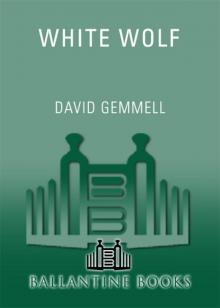 White Wolf
White Wolf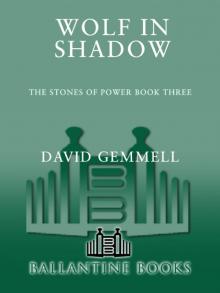 Wolf in Shadow
Wolf in Shadow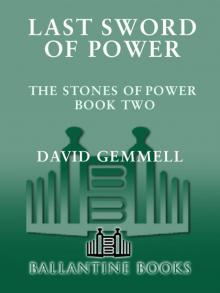 Last Sword of Power
Last Sword of Power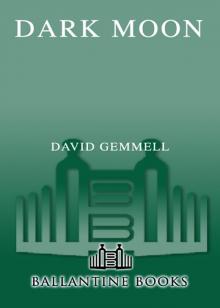 Dark Moon
Dark Moon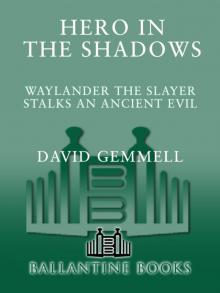 Hero in the Shadows
Hero in the Shadows Gemmell, David - Drenai 09 - Hero In The Shadows
Gemmell, David - Drenai 09 - Hero In The Shadows Waylander
Waylander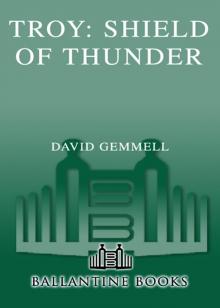 Shield of Thunder
Shield of Thunder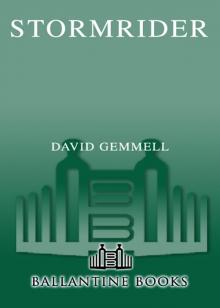 Stormrider Stormrider
Stormrider Stormrider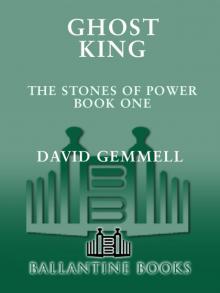 Ghost King
Ghost King Legend
Legend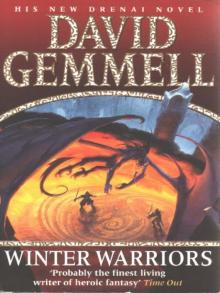 Winter Warriors
Winter Warriors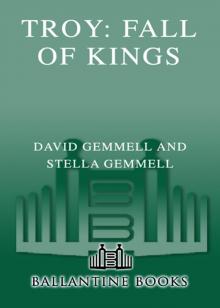 Fall of Kings
Fall of Kings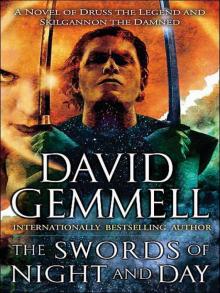 The Swords of Night and Day
The Swords of Night and Day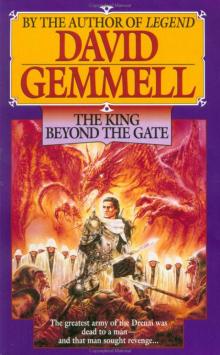 The King Beyond the Gate
The King Beyond the Gate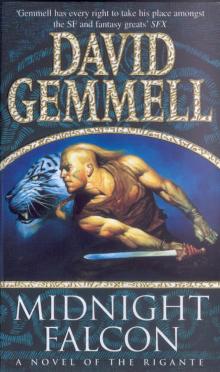 Midnight Falcon
Midnight Falcon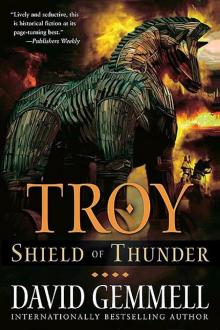 02 - Shield of Thunder
02 - Shield of Thunder In the Realm of the Wolf
In the Realm of the Wolf Ravenheart
Ravenheart The First Chronicles of Druss the Legend
The First Chronicles of Druss the Legend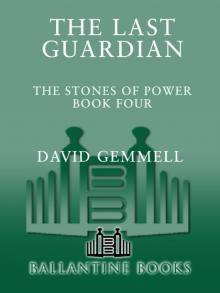 Last Guardian
Last Guardian Stormrider
Stormrider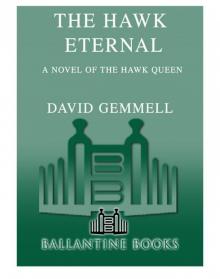 The Hawk Eternal
The Hawk Eternal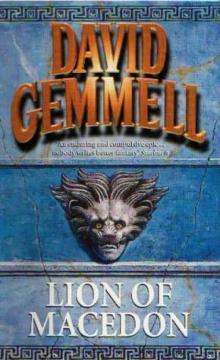 Lion of Macedon
Lion of Macedon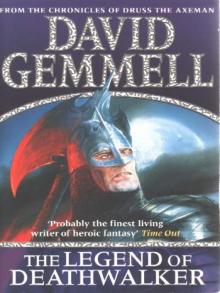 The Legend of Deathwalker
The Legend of Deathwalker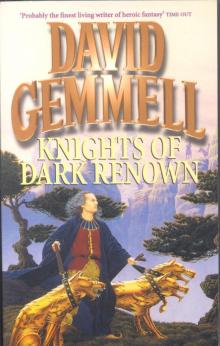 Knights of Dark Renown
Knights of Dark Renown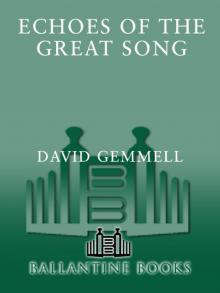 Echoes of the Great Song
Echoes of the Great Song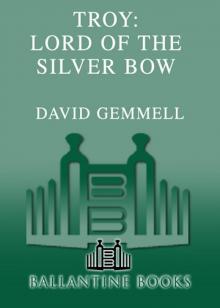 Lord of the Silver Bow
Lord of the Silver Bow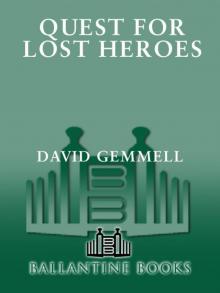 Quest for Lost Heroes
Quest for Lost Heroes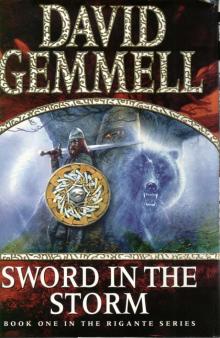 Sword in the Storm
Sword in the Storm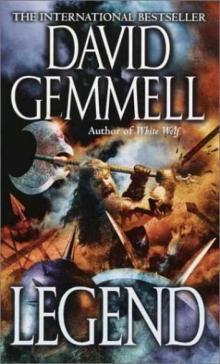 Drenai Saga 01 - Legend
Drenai Saga 01 - Legend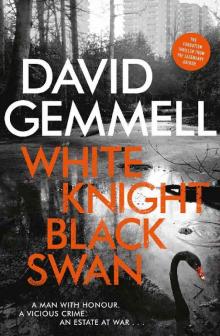 White Knight/Black Swan
White Knight/Black Swan![[Troy 02] - Shield of Thunder Read online](http://i1.bookreadfree.com/i/03/19/troy_02_-_shield_of_thunder_preview.jpg) [Troy 02] - Shield of Thunder
[Troy 02] - Shield of Thunder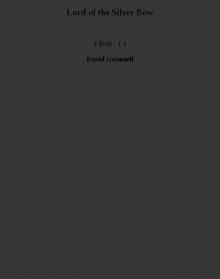 Lord of the Silver Bow t-1
Lord of the Silver Bow t-1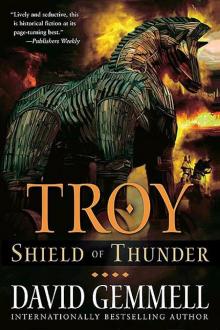 Shield of Thunder t-2
Shield of Thunder t-2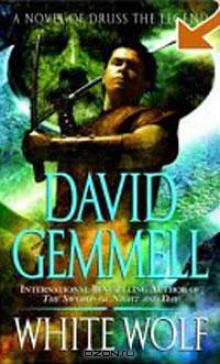 White Wolf: A Novel of Druss the Legend dt-10
White Wolf: A Novel of Druss the Legend dt-10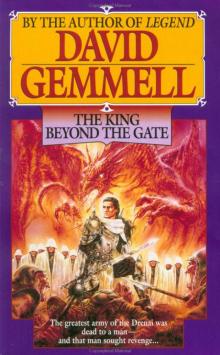 Drenai Saga 02 - The King Beyond the Gate
Drenai Saga 02 - The King Beyond the Gate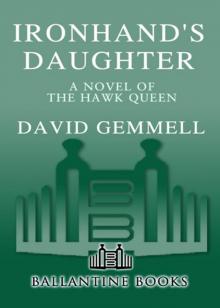 Ironhand's Daughter
Ironhand's Daughter Gemmell, David - Drenai 06 - The First Chronicles of Druss the Legend
Gemmell, David - Drenai 06 - The First Chronicles of Druss the Legend The Last Guardian
The Last Guardian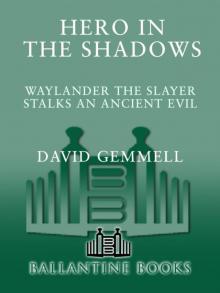 Hero in the Shadows: A Waylander the Slayer Novel
Hero in the Shadows: A Waylander the Slayer Novel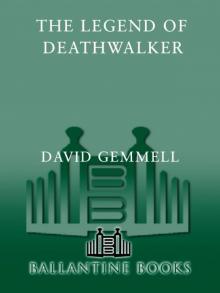 The Legend of the Deathwalker
The Legend of the Deathwalker